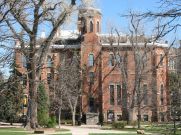The re-release of videos showing Barack Obama as a Harvard Law School student in 1991 speaking at a rally in support of professor Derrick Bell has so far occasioned little more than a yawn from academe. The late Professor Bell (1930-2011) is a reasonably well-known figure among those of us who follow racial controversies in higher education, but he is far from a household name. Moreover, there is a triple discount available on this purchase. The precipitating event was (a) long ago; (b) involved intemperate declarations by a student; and (c) requires taking seriously racial bombast by a black professor. These provide a neat package of reasons to put the matter aside as a pseudo-controversy.
That may, however, prove to be a mistaken judgment. Bell could come into sharper focus for the general public in the days ahead, and we don’t know yet how deep or durable his influence on Obama really was. At least at one point, the association worried some Obama supporters. Harvard Law professor Charles Ogletree referring to the footage admits, “I hid this during the 2008 campaign,” but “I don’t care if they find it now.”
Back Story
For those who haven’t followed the story, on February 10, the conservative provocateur-journalist Andrew Breitbart announced at the American Conservative Union’s Conservative Political Action Conference (CPAC) that he had possession of a videotape showing Barack Obama as a student. He said to a cheering crowd:
Well I’ve got videos by the way, this election we’re going to vet him, from his college days, to show why racial division and class warfare are central to what “Hope and Change” was sold in 2008.
But on March 1, before he had planned to release the tapes, Breitbart dropped dead of a heart attack. On March 7, Breitbart’s successors at Breitbart.com, Ben Shapiro and Joel Pollak, who is editor-in-chief of the site, appeared on Fox network’s The Sean Hannity Show and presented some of the video. The Hannity appearance was preceded earlier in the day with a release by Andrew Kaczynski at Buzzfeed of one version of the video—an apparent attempt to blunt the surprise.
The original story began in 1990 when Bell led a protest demanding that Harvard Law School appoint more minority and women faculty members. Bell announced a kind of one-man strike—a leave of absence—until he got his way, and proceeded to make public speeches advocating his position, which became extraordinarily aggressive. In 1991, Bell demanded that Harvard Law not only hire more black women professors but that it take care to avoid hiring black women professors who think like whites. Robert Zafft, a Harvard Law student who attended one of Bell’s speeches, wrote a letter to the Harvard Crimson at the time describing what he called Bell’s “repugnant” message of racial intolerance. Bell’s protest didn’t deprive him of a livelihood. He accepted a visiting position at New York University. Harvard terminated his position in 1992 after Bell failed to return from his leave of absence.
Barack Obama entered the story in 1991 when, in his final semester at Harvard Law, he spoke at a rally in support of Bell.
Bombshell?
On March 8, Pollak appeared on CNN’s Starting Point for an interview with Soledad O’Brien, who asked him why he thought the Bell-Obama tape was a “bombshell.” Their exchange is fast-paced and fascinating. Here is my transcription of part of it for those who want to see it in slow motion:
O’Brien: What part of that is the bombshell? Because I missed it. I don’t get it. What was a bombshell?
Pollak: Well, the bombshell is the revelation of the relationship between Obama and Derrick Bell. Obama didn’t just lead a protest on behalf of…
O’Brien: He’s a Harvard Law student and a Harvard law professor. Yeah?
Pollak: That’s correct. And Derrick Bell is the Jeremiah Wright of academia. He passed away last year but during his lifetime he developed a theory called critical race theory, which holds that the Civil Rights Movement was a sham, and that white supremacy is the order and it must be overthrown.
O’Brien: So that is a complete misreading. I’ll stop you there for a second, then I am going to let you continue, but that’s a complete misreading of critical race theory. As you know, that’s an actual theory. And you could Google it and someone would give you a good definition of it, so that’s not correct, but keep going.
Pollak: In what way is it a critical misreading? Could you explain that to me? Do you know what critical race theory is? Explain to your readers [sic] what critical race theory is. Explain to your viewers.
O’Brien: I am going to ask you to continue on. I’m just going to point out, that isn’t accurate. Keep going. Tell me what the bombshell is. I haven’t seen it yet.
Pollak: Wait a minute. You have made a claim that my characterization of critical race theory as the opposite of Martin Luther King is inaccurate. You are telling your viewers that, but you are not telling them what it is.
O’Brien: Critical race theory looks into the intersection of race, and politics, and the law, and as a legal academic who would study this and write about it, he would advance the theory about what exactly happened when the law was examined in terms of racial politics. There is no white supremacy in that. It is a theory. It is an academic theory. And as a one of the leading academics at Harvard Law School, he was one of the people that was part of that conversation. So that is a short definition of it, now…
Pollak: I’m glad that we have you saying that on tape because that’s a complete misrepresentation. Critical race theory is all about white supremacy. Critical race theory holds that civil rights laws are ineffective. That racial equality is impossible because the legal and constitutional system in America is white supremacy.
O’Brien: What I just said: the intersection of race and politics when it comes to under the law.
Pollak: No, but you said white supremacy is not part of it. You said…
O’Brien: But I don’t want to argue what I said. I’m trying to figure out what’s the bombshell?
Pollak: But this is critical. This is critical. This is critical.
O’Brien: Get back on track. What’s the bombshell?
Pollak: This is critical.
O’Brien: It is not critical.
Pollak: This is critical. You can’t derail this Soledad. White supremacy is the heart of critical race theory and Obama knew it. And by the time Obama embraced him at Harvard Law School, Derrick Bell had already given a speech in Chicago just two months before, that caused a sensation which was about how white supremacy was still the order of the day and that black people were fooling themselves if they thought that civil rights and equality were achievable goals. He said this and one of the people who came to his defense, by the way, was Jeremiah Wright with whom Bell had correspondence over the years. This is a connection that is very important.
O’Brien: So your point, you are trying to make the point, that Derrick Bell was somehow a serious radical? Is that what you are trying to say? And by connecting President Obama to Derrick Bell, a Harvard law student to a Harvard law professor, the first black tenured professor at Harvard Law School, you are trying to make the connection, is that the bombshell?
Mainstream Radicalism
The O’Brien-Pollak exchange is surely grist for divergent enthusiasms. What I find most interesting is O’Brien’s pretense that because critical race theory is a “theory,” it has nothing to do with “white supremacy.” She seems touchingly oblivious to the possibility that CRT is a theory that posits the centrality of white racism in the American legal system. The answer to her last question is surely yes: Pollak is attempting to connect President Obama with a “serious radical.” Bell’s appointment as a tenured professor at Harvard Law School in no way stands as evidence that he was not “a serious radical.” To the contrary, Bell prided himself on his radicalism. Those who paid attention to his career at Harvard, punctuated by outbursts of public protest against imaginary instances of institutional racism, can hardly think otherwise. Anyone doubting the radicalism of his theory can easily consult his own statements, as in his 1995 article, “Who’s Afraid of Critical Race Theory?“
But I don’t take O’Brien’s bafflement as a pose. She seems genuinely incredulous that anyone would take professor Bell—the first black tenured professor at Harvard Law School!—as a radical, or that anyone would be discomforted by Barack Obama’s enthusiasm for the man and his theories. The word “Harvard” does amusing things to the minds of some journalists.
O’Brien’s incredulity, however, speaks volumes about the academic mainstreaming of fringe anti-American theories. Critical race theory has next to nothing going for it as a descriptive analytic of how American jurisprudence works. It doesn’t fit the facts of American life from Brown v. the Board of Education, to court enforcement of the Voting Rights Acts, the Civil Rights Act, or hundreds of other pieces of legislation. Critical race theory is weirdly and wildly wide of the mark in either explaining how Americans have made and interpreted their laws for at least the last fifty years, and arguably long before that. CRT might have been useful as a historical frame for interpreting the Jim Crow era, but even then it fails to provide any sort of reasonable account of the 14th Amendment and Reconstruction. But CRT is not a theory about the Jim Crow era: it is a theory about the present. Its pretense, as Pollak accurately says, is that the Civil Rights Movement was hollow and that we continue to live in a nation the laws of which are pervasively racist.
Of course, there are few theories aggressively disdainful of American society, however manifestly absurd, that lack a cheering section in contemporary academe. So “critical race theory” does now have a place in the curriculum. Indeed, it is now widely taught in law schools and in some undergraduate programs. That doesn’t make it any less absurd. It just specifies what kind of absurdity it is: an academic one, brought to us originally by a radical Harvard law professor and sustained by faculty members committed to the promotion of grievance ideology. And given academic racial politics, it is more or less exempt from “critical thinking,” serious academic criticism, or the simple scorn which is its rightful due.
This article originally appeared in the Chronicle of Higher Education's Innovations blog on March 13, 2012.













